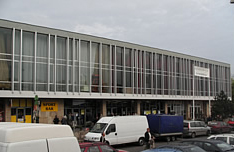
<html>Kladno approved a grant of 4.8 million for the renovation of the House of Culture</html>
 |
"The Trade Union Council will have to operate the cinema and cultural activities there for at least five years, especially balls, dances, and concerts, so that the investment doesn't only go to someone's building, but so that the city secures that culture will be here," said Mayor Dan Jiránek (ODS) to journalists.
The grant is designated for two purposes. Firstly, the rear glass wall will be replaced to reduce heating costs. According to Jiránek, this will contribute to environmental protection and simultaneously keep the price of balls and dances, which is always threatened by increases in heating prices or higher heating costs.
The second half of the grant is intended for the modernization of the Hutník cinema. "Although the regional council approved a grant for the digitalization of the cinema in 2009, it never actually provided it. And the city of Kladno definitely does not want to lose the only cinema in its territory. I can't even imagine such a large city being without a cinema. On the other hand, we realize that without digitalization, the cinema will not sustain itself in the long term," the mayor stated.
ODS representative František Samek pointed out that the city has limited options for influencing activities in the cultural center. "There have been numerous tenants here. No one did anything about it, just made promises," he declared. Therefore, he would welcome a discussion on whether the trade union council would want to sell the building to the city. "I would say that it is more important than a football stadium," he believes.
However, Jiránek noted that before such a debate, it is necessary to find out what investments would be required in the building. "The purchase price is not the most important, but what will need to be done in the next ten years to prevent the building from collapsing," he argued. He also pointed out that given the current financial situation, the city cannot afford to buy the building. The mayor's deputy Miroslav Bernášek (ODS) specified that six years ago the property was valued at 45 million and that under current circumstances, the city could manage to pay off this amount in about five years.
The head of the steelworkers' union Richard Mosr, whom the representatives called to attend the meeting, pointed out to those present that a contract for a future purchase agreement has already been signed, so it is likely that the building cannot even be sold to the city. He did not specify who is pursuing the union's property.
According to him, approximately four million crowns have been invested in the cultural house in recent years. All profits from the rentals of this facility, which amount to around 1.2 million crowns a year, are, according to Mosr, reinvested back into the building.
The English translation is powered by AI tool. Switch to Czech to view the original text source.
0 comments
add comment






